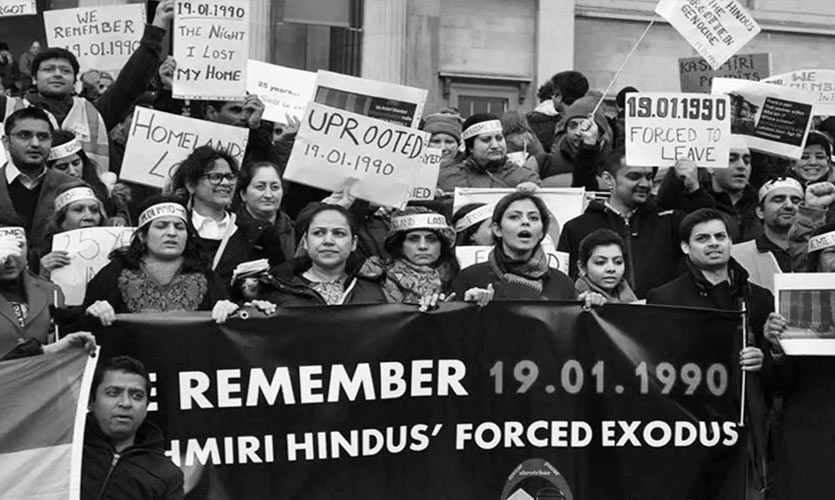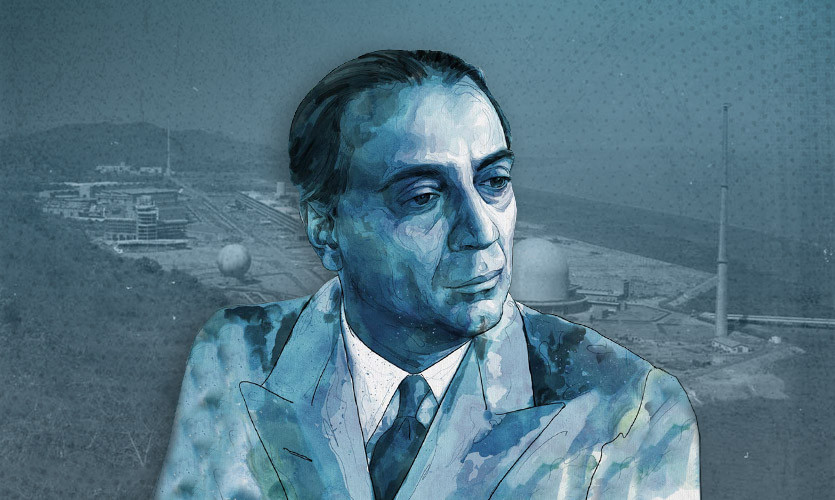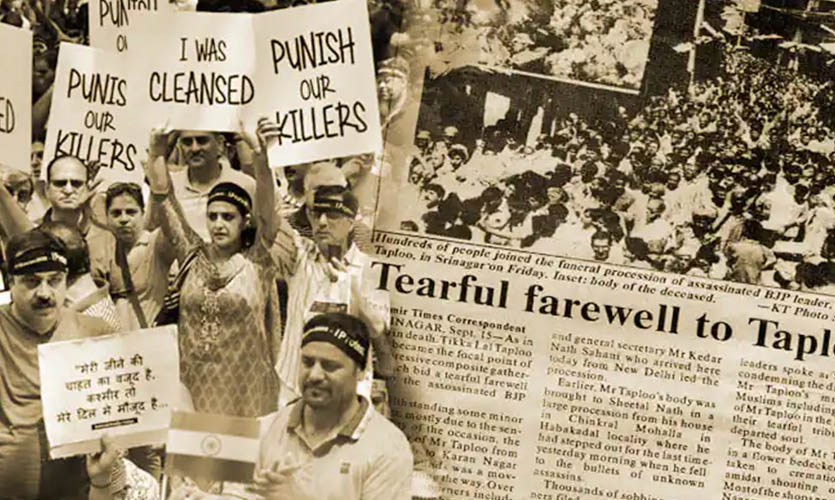The recent civilian killings in the Kashmir Valley have raised questions on the possibility of the return of Kashmiri Pandits once again. Three decades later, a community displaced from their hometown, is farther away from home than ever before.
The recent killings of Kashmiri locals who belonged to the minority Hindu and Sikh communities in the union territory of Jammu and Kashmir, has thrown the Indian government’s plans of rehabilitating the migrants awry. Reminiscent of the 1990 exodus of Kashmiri Hindus, it became another opportunity missed by Prime Minister Narendra Modi for an uncomfortable but necessary conversation with the people, while leaders in J&K didn’t fail to make it about themselves.
People’s Democratic Party leader and former J&K chief minister, Mehbooba Mufti has always maintained and reiterated the need to have an open dialogue with Pakistan. While she condemned the killings, her stand did not change. Moreover, she did not hesitate to make some other statements. At a public event, Mufti said, “We met families of those who die due to militants’ bullets. Recently, CRPF shot dead a person of scheduled caste (ST) community. Went to meet his family, but the house was locked. What is this system? If an official kills a civilian in the country, that is shielded, but if a terrorist kills a civilian is considered wrong.” Her caste and religion-based politics also shone through on her recent statement on Aryan Khan’s arrest in the recent NCB raid.
National Conference (NC) leader Omar Abdullah also condemned the killings but seemed to have a political turmoil to deal with. Devendra Singh Rana and Surjit Singh Salathia quit the NC within a week after local pharmacist Makhan Lal Bindroo’s murder. “For years now I have been shielding Devendra Singh and to an extent Salathia from the sort of conspiracies in the party,” said Abdullah. However, their exit seemed to pertain only towards strengthening the Jammu declaration.
Promises of Convenience
According to a press release issued by the Ministry of Home Affairs in March 2021, “44,167 Kashmiri Migrant families are registered who had to move from the valley since 1990 due to security concerns. Out of these, the count of registered Hindu Migrant families is 39,782.” To encourage the policy for Return and Rehabilitation of Kashmiri Migrants to Kashmir Valley designed under the prime minister’s packages in 2008 and 2015, housing, employment and cash assistance was warranted to the community. J&K Lt. Governor Manoj Sinha had also said that about 8000 bunkers had been constructed for the safety of border residents, and had hinted at improving conditions saying, “something is going to happen which you have not even imagined”.
“How can KPs be rehabilitated if you can’t ensure security?” wrote Aditya Raj Kaul, a contributing editor at CNN-News18. Following the killing of M.L. Bindroo, he marked in a series of tweets, “On 21 September I was told J&K Security forces first received Intel input about a possible attack on Kashmiri Hindus in Srinagar. Before this in July there was an input about a possible attack on a Hindu businessman. Earlier there was also a threat on a Hindu chemist at Dal Gate.”
When it comes to Kashmir, the Indian government seems to have a habit of acting in retrospection of transpired events. Even though the security forces have reportedly managed to neutralise the perpetrators of the recent killings, the inaction over the initial intel came at great cost to the armed forces and the minority communities. Moreover, the lack of a media blackout following the civilian killings of Kashmiri Pandits and Sikhs, and the enforcement of said blackouts otherwise, is worrying. According to ANI, out of the 28 civilians killed during 2021, only five belonged to local Hindu and Sikh communities and two were non-local Hindu labourers. The lack of questions raised by the media over the deaths of people from the Muslim community is also concerning.
Migrant Kashmiris On Going Back
Most members of the Kashmiri Pandit community believe that keeping politics over people’s lives and security is what deteriorated the situation in Kashmir. On December 8, 1989, Mehbooba Mufti’s sister, Rubaiya Sayeed was kidnapped by Jammu and Kashmir Liberation Front (JKLF) militants. Her captors demanded the release of five JKLF members – Sheikh Abdul Hameed, Ghulam Nabi Butt, Noor Muhammad Kalwal, Muhammed Altaf, and Mushtaq Ahmed Zargar – in exchange for her safe return. At the time, Rubaiya and Mehbooba’s father, Mufti Mohammad Sayeed was the home minister at the Centre, in the then prime minister, V.P. Singh’s government. While negotiations opened through various channels and the Centre was adamant on meeting the demands of the JKLF, the J&K chief minister at the time, Dr Farooq Abdullah, refused to release the militants. “A senior minister in Mr V.P. Singh’s Cabinet specially flew into Srinagar with the threat… I did not deter from my stand and refused to release any militant,” said the former CM years later, claiming that this move led to his resignation and dissolution of the National Conference and Congress coalition in J&K.
Some Kashmiri Pandits believe that Rubaiya Sayeed’s kidnapping was staged, and that it was a direct cause for the exodus as the released militants took arms against the minorities almost immediately. While charges were brought against ten JKLF militants allegedly involved in the kidnapping, as per a January 2021 report, 12 others remain absconding.
“Absolute security failure. It’s 1990 all over again,” says a second-generation Kashmiri migrant*. On being asked if rehabilitation would ever be on the table, he said, “We have been forced to build lives outside. But to have a home, to have some kind of physical connection to our homeland, I thought, would be very important and would add meaning to our lives. Looks like we still have a long way to go.”
Another Kashmiri Pandit migrant says, “I was attacked for wearing a bindi to college, my brother kidnapped for being a part of the RSS, and we lost our father to the heartbreak of having to leave the Valley. Some of our neighbours, our friends turned against us… going back is not an option.”
She recalls the death of one of the tallest leaders of the Kashmiri Pandit community, Tika Lal Taploo, on September 14, 1989. “He was killed in the middle of the street, and no one was allowed to even recover the body. It wasn’t until the armed forces reached the scene that he was finally taken home. Even so, there was stone pelting on his funeral procession later. How can you go back to that?” she questions. Taploo’s death was followed by the murder of Jammu and Kashmir High Court judge, Neelkanth Ganjoo, on November 4, 1989. As a Sessions Court judge in the 1960s, Ganjoo had presided over the trial of JKLF founder Maqbool Bhat, sentencing him to death for the murder of police inspector Amar Chand.
“Until the demographics change drastically, there is no going back,” says another Kashmiri migrant. He explains, “While there are also Muslims who do not want anything to with the debate on Kashmir, like the ones who left with us to escape the violence in the Valley, it is all the same if there is no effort to change and we will never be safe there.”
While some Kashmiri migrant sources do feel that conducting a plebiscite according to the UN Security Council’s Resolution 47 would provide a decent middle ground to kickstart the process towards peace, the Pakistan of it all leaves them with little room for hope. One of the sources reiterates, “According to the resolution, Pakistani forces will have to withdraw to pre-1948 posts, which means that they will have to leave the Pakistan-occupied-Kashmir area. That will never happen.”
Whatever the Kashmiri Pandits’ beliefs about the series of events and the majority community in the Kashmir Valley, one sentiment is common among them all: “We have accepted that we can’t go home.”
* Sources kept anonymous for safety reasons.
The Horus Eye is a weekly column written by Divya Bhan analysing current affairs and policies. This column does not intend or aim to promote any ideology and does not reflect the official position of The Sparrow.
Also read: Revisiting J&K’s Reorganisation And Article 370
Also read: Does The Demand For A Uniform Civil Code Overlook India’s Religious Freedom?










